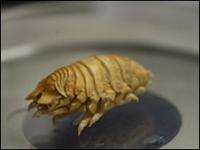September 14, 2009 weblog
Isopod Replaces Fish's Tongue

(PhysOrg.com) -- An isopod that replaces a fish's tongue has been discovered for the first time in the Channel Islands in Europe. The marine isopod, described by its finder as hideous and vicious, is a rare find.
The one-inch long isopod was found in a weaver fish's mouth by fishermen off the uninhabited Minquiers Islets (under the jurisdiction of Jersey, which is off the coast of Normandy, France). Marine isopods are crustaceans related to shrimps and crabs, and a number of species in the order Isopoda are parasitic. The Jersey specimen resembles a terrestrial louse.
Among the fishermen was Paul Chambers, a marine scientist from the Soci?t? Jersiaise, who struggled to identify the specimen for several weeks before identifying the creature from a Victorian journal. Scientists from the University of Southampton confirmed the identification.
Chambers said he was surprised to find the isopod outside of the Mediterranean Sea, but the University of Southampton told the BBC that several had been sighted in 1996 off the coast of Cornwall. A similar isopod is also known to parasitize the spotted rose snapper off the coast of California.
The isopod, described by Chambers as "hideous" and quite large, burrows into its fish host and takes up position on the fish's tongue, where it lives on the host's blood. As the tongue is starved of blood it atrophies and is gradually replaced by the isopod. The fish is able to survive the experience with no apparent harm other than the loss of its tongue to the parasite.
Isopods are not harmful to humans, although they have dozens of sharp claws on their underside, and Chambers said they can be quite vicious and are capable of giving a nasty nip if you pick them up.
© 2009 PhysOrg.com

















